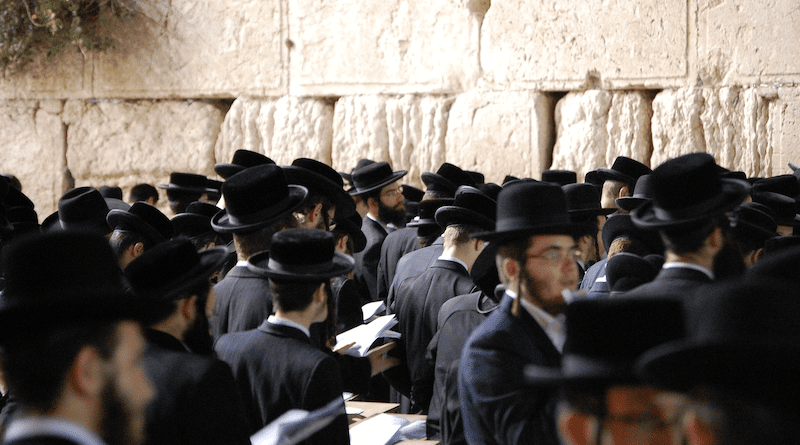Power Tends To Corrupt; And Religious Power Corrupts Religiously – OpEd
The Islamic organization Nahdlatul Ulama believes it is essential to the well-being of Muslims to develop a new vision capable of replacing the long-established aspiration, rooted in Islamic jurisprudence (fiqh), of uniting Muslims throughout the world into a single universal state, or caliphate.
The group said: “It is neither feasible nor desirable to re-establish a universal caliphate that would unite Muslims throughout the world in opposition to non-Muslims. As recently demonstrated by the Islamic State in Iraq and Syria, or ISIS, attempts to do so will inevitably be disastrous and contrary to the purposes of Sharia (Islamic law): i.e., the protection of religion, human life, sound reasoning, family, and property.”
And in Israel less than a third of Jewish Israelis say they have significant trust in the Chief Rabbinate, according to recent survey data from the Israel Democracy Institute. Among self-identified secular Jews, who represent 41 percent of Israel’s Jewish population, less than 10 percent say they have trust in the Chief Rabbinate — the lowest rating ever.
The poll released last week, which assessed public trust in national institutions, found that 30 percent of Jewish Israelis in 2022 said they had “quite a lot” or “very much” trust in the Chief Rabbinate, the government body that oversees all official aspects of Jewish life in Israel, namely marriage, divorce, burial, conversion and kashrut certification.
Public faith in the Chief Rabbinate is particularly significant as the current ultra-religious coalition government, the most religious in Israel’s history, has explicitly called for expanding the Chief Rabbinate’s power and limiting oversight, particularly in rabbinic courts.
People who identified as religious tended to have greater faith in the Chief Rabbinate than did those who said they were secular or traditional. Last year, 71 percent of ultra-Orthodox, or Haredi, Israelis said they had faith in the Rabbinate, as did 54 percent of national-religious Israelis, compared to 33.5 percent of people who said they were traditional and 9 percent of secular Israelis.
And yet, when looking at longer-term trends, public trust in the Rabbinate has been steadily decreasing over the past 20 years among all Jewish Israelis, from ultra-Orthodox to secular.
This has been more pronounced among traditional non-Orthodox Jews and secular Israelis, where it has dropped from 50% and 32% in 2003, respectively, to their current levels of 33.5% and 9%. But it can also clearly be seen among ultra-Orthodox and national-religious Israelis, which decreased from 80% and 76% in 2003, respectively, to their current levels of 71% and 54%.
I think the current right wing coalition will cause trust in the Chief Rabbinate to decline further and faster in accordance to the well known insight that power tends to corrupt; and religious power corrupts religiously. As the Torah states: “Do not be overly righteous, and do not make yourself too wise. Why should you destroy yourself?” (Ecclesiastes 7:16) Why does Prophet King Solomon tell us: “Do not destroy yourself by being too good or acting too smart! ”
The evidence of the wisdom of this saying is that the government is expediting a law imposing sweeping restrictions on the freedom of worship at the Western Wall, banning egalitarian, mixed-gender prayer at the section of the holy site where it is now allowed, criminalizing the activity of the Women of the Wall prayer rights group, and banning visitors from wearing attire deemed immodest.
The legislation, which penalizes offenders with a six-month prison term or a NIS 10,000 ($2,900) fine, drew fierce and widespread condemnation but the ultra-Orthodox parties keep pushing for it; and ignore the warnings of the founder of the Hassidic movement The Baal Shem Tov who taught:
“You should not be overly strict in any observance. Excessive strictness is the advice of the Yetzer HaRa (the evil impulse). It makes a person fear that he has not done things just right and so brings him into depression- the greatest obstacle to serving God.”
And his grandson Rabbi Nachman taught ‘It is impossible for a mortal human being to fulfill all his duties perfectly. You should not be overly strict and stringent.”
The Al hait prayer originally had 6 verses and still does in Sephardic and Yemenite rites. It then grew to: 22 in Italian, and 44 in Ashkenazi rites. Al hait was originally recited once in each of the 5 services of Yom Kippur, and then doubled to 10. This is a good example of seeking to be overly righteous and pious.
A longer religious service is not better than a shorter service; just as eating or drinking more is not better than eating or drinking less.
The Torah (Deuteronomy 4:2 and Deuteronomy 13:1) says” do not add to and do not subtract from” God’s commandments. This is an excellent principle. Since the generations are always changing, some change is always needed, but we are commanded to maintain the original balance. Thus, “do not add to” unless you also subtract from, and “do not subtract from” unless you also add to, is the answer.
Unfortunately, since the destruction of Jerusalem, Orthodox rabbis have continually added prohibitions and restrictions and rarely permitted subtracting.

